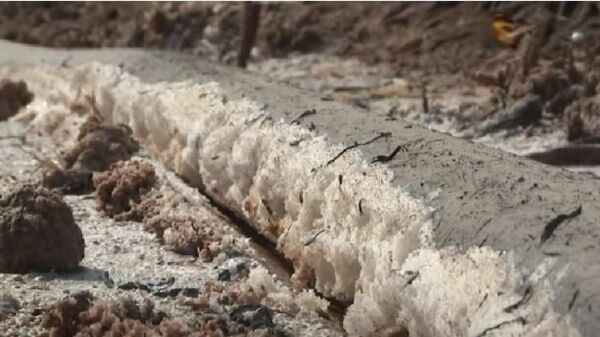Thailand’s potash push: Prosperity or peril?

As Thailand eyes a leap into the lucrative potash market, concerns loom large over the potential environmental havoc it may unleash.
Residents in the vicinity of Thailand’s solitary commercial potash mine have raised a chorus of apprehension, cautioning against Prime Minister Srettha Thavisin’s grand vision to catapult the nation into a leading potash producer. Their concerns centred around the likely devastating environmental toll in the Isaan region, ring with urgency and fear.
Duenrung Munkhuntod, a farmer near the Thai Kali Co mine in Nakhon Ratchasima’s Dan Khun Thot district, expressed profound scepticism.
“The prime minister talks about how fertiliser prices will drop. But what good will it do if our land becomes infertile?”
Thai Kali Co secured a 25-year mining license in 2015, starting potash extraction in Dan Khun Thot in 2017. However, operations hit a roadblock in 2019 when saltwater overflowed from mineshafts, ravaging the surrounding soil. Local environmentalists decried the pollution’s dire impact on crops and water supply.
In Ban Sap Makham village, adjacent to the mine, the grim aftermath is starkly visible: salt crystals litter the ground, and once lush trees now stand withered.
A resident, Supanee Thong-ulai reminisced that eight years ago her family’s land plot was green and abundant. Today, a saline deluge engulfs half her estate, while the remainder lies barren amidst salt-crusted patches. The ominous spread of the white phenomenon paints a harrowing picture of the town’s plight.
Opposing interests
Adding to the local distress is PM Srettha’s ultimatum demanding an acceleration in potash mining nationwide. In a bold move last November, he warned three licensed companies of potential revocation unless operations commenced promptly.
Despite government assertions of Thailand’s substantial potash reserves, ranking fourth globally, behind Canada, Belarus, and Russia, discontent simmers over the nation’s hefty potassium imports, draining billions annually.
The government’s narrative touts a promising future, promising a significant drop in potash-based fertiliser prices, translating to substantial savings for farmers and lucrative export prospects. Yet, amid these rosy projections, dissent brews amongst affected communities, vehemently opposed to the precipitous mining expansion.
Industry Minister Pimphattra Wichaikul’s recent directive, urging licensees to expedite investment plans, underscores the government’s unwavering commitment to its potash agenda. However, grassroots resistance persists, with locals resolved to defend their land and livelihoods at any cost, reported Thai PBS World.
In Chaiyaphum, ASEAN Potash Chaiyaphum Co, grappling to kickstart extraction, faces mounting opposition. Tests reveal alarming salinity levels, rendering farmland barren and water sources undrinkable. Villagers decry the mine’s menacing encroachment, lamenting the toll on their once-thriving community.
Environmental assessments paint a dire picture, citing extensive contamination of soil and water with chemical salts, exacerbating fears of irreversible ecological damage.
Latest Thailand News
Follow The Thaiger on Google News:


























